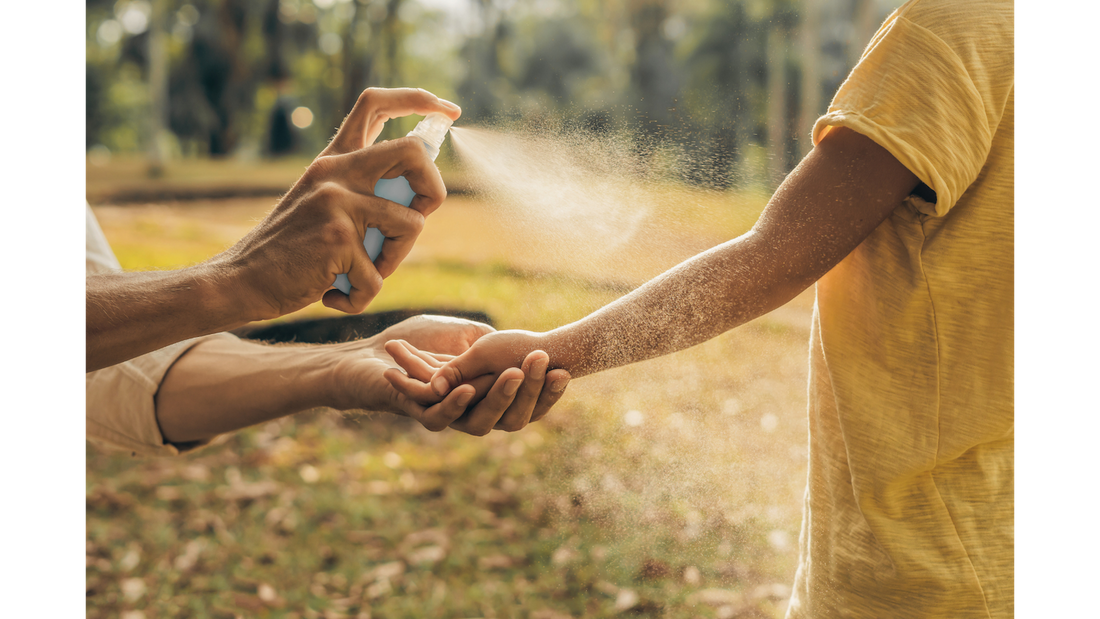
How to Make a DIY Bug Repellent Spray with Essential Oils
Share
Bug Off!
In the buzzing chaos of summer, nothing disrupts a peaceful evening more than swatting away pesky insects. But fear not, you can reclaim your serenity with a touch of plant magic. Let me share my herbal knowledge and empower you to create a powerful, natural bug repellent. This guide will show you how to blend essential oils and ancestral wisdom to craft an effective, non-toxic bug spray. The Rise of Natural Insect Repellents.
Gone are the days when chemical-laden bug sprays were our only option. Today, more and more people are turning to natural solutions to protect themselves from insects. Why? Because these alternatives are not only effective but also safer for you, your family, and the environment. Natural insect repellents are gaining popularity for their gentle yet powerful ability to keep bugs at bay without exposing you to harmful toxins.
What is a Homemade Bug Spray?
A homemade bug spray is a DIY insect repellent crafted from natural ingredients, primarily essential oils. These sprays harness the power of nature to deter insects effectively. By combining specific essential oils known for their bug-repelling properties, you can create a custom blend that suits your preferences and needs.

Benefits of a Homemade Bug Spray
Why should you consider making your own bug spray? Here are some compelling reasons:
- Effective and Natural: Provides a powerful, natural, and non-toxic alternative to commercial bug sprays.
- Safe for You and the Environment: Contains no harmful chemicals, making it safe for both you and the planet.
- Nourishing: The carrier oil nourishes and moisturizes your skin, unlike other repellents that can dry it out.
- Versatile: This eco-friendly bug spray can be used both indoors and outdoors without the risk of staining.

The Dirty Harmful Ingredients in Commercial Bug Repellent
While commercial bug repellents offer convenience, many contain ingredients that may pose health risks and environmental concerns. Some of the commonly found harmful ingredients include:
- DEET (N, N-Diethyl-meta-toluamide) : Although effective at repelling insects, DEET can be absorbed through the skin and has been associated with skin irritation, rashes, and, in extreme cases, neurological issues.
Permethrin : This chemical is used as an insect repellent and a pesticide. It has been linked to toxic effects on the nervous system and is highly toxic to aquatic life, causing significant environmental harm.
Synthetic Fragrances : Many bug sprays include artificial fragrances that can trigger allergies, respiratory issues, and skin sensitivities. These fragrances often contain phthalates, which are endocrine disruptors.
Parabens : Used as preservatives, parabens can be absorbed through the skin and have been associated with hormonal imbalances, reproductive issues, and an increased risk of certain cancers.
Alcohol : High alcohol concentrations can cause skin dryness, and irritation, and may increase the absorption of other harmful chemicals through the skin.

By being aware of these ingredients, we can make more informed decisions and opt for natural, homemade alternatives that are healthier for us and kinder to the environment.
Ingredients and Tools
Here’s what you’ll need to whip up your very own natural insect repellent:
Essential Oils :
10 drops of citronella oil
5 drops of peppermint oil
5 drops of lavender oil
Carrier Oil :
Vodka :
Acts as an emulsifier
Distilled Water :
To dilute the mixture
Tools:
Spray Bottle :
Preferably a dark glass one to preserve the oils.
Measuring Spoons :
For accurate measurement of ingredients.

Steps to Create Your Homemade Bug Spray
Now, let's bring this concoction to life. Follow these simple steps to create your very own homemade bug spray:
Step 1: Prepare the Spray Bottle
First things first, sterilize your spray bottle. Rinse it with hot water to ensure it’s clean and ready for your magical concoction.
Step 2: Combine Essential Oils and Carrier Oil
In a small bowl, mix 1 teaspoon of your chosen carrier oil with the essential oils. Feel free to adjust the number of drops based on your preference for scent and potency.
Step 3: Add Vodka
Pour 2 tablespoons of witch hazel or vodka into the spray bottle. This helps the essential oils mix more effectively with the water.
Step 4: Combine and Dilute
Add the essential oil mixture to the spray bottle. Fill the rest of the bottle with distilled water, leaving a little space at the top for shaking.
Step 5: Shake Well
Before each use, shake the bottle well to ensure the ingredients are thoroughly mixed.
Step 6: Usage
Spray the mixture onto exposed skin and clothing, avoiding the eyes and mouth. Reapply as needed, especially after sweating or swimming.
Tips for the Best Results
To ensure your homemade bug spray is as effective as possible, keep the following tips in mind:
Test First
Try the mixture on a small patch of skin to ensure there are no allergic reactions.
Storage
Keep the repellent in a cool, dark place to maintain its efficacy.
Customize
Adjust the concentration of essential oils based on your sensitivity and the level of bug activity.

The Magic of Essential Oils
Essential oils are the heart of your homemade bug spray. They not only smell divine but also have powerful insect-repelling properties. Here's a closer look at the oils we're using:
Citronella Oil
Citronella oil is renowned for its effectiveness against mosquitoes. Its strong, lemony scent masks the human scents that attract mosquitoes, keeping them at bay.

Peppermint Oil
Eucalyptus oil has a fresh, invigorating aroma that's not only refreshing but also repels mosquitoes and other insects. It's a popular choice for natural bug repellents.

Lavender Oil
Lavender oil is a household favorite for its calming properties. In addition to its relaxing scent, it also deters mosquitoes, flies, and other annoying bugs.

Why Choose a Natural Insect Repellent?
Choosing a natural insect repellent over a chemical one has numerous benefits. Here’s why it’s worth making the switch:
Health Benefits
Natural insect repellents are free from harmful chemicals like DEET, which can cause skin irritation and other health issues. They provide a safer option for you and your loved ones.
Environmental Impact
Chemical-based bug sprays can harm the environment, contaminating water sources and affecting wildlife. Natural repellents are eco-friendly and biodegradable, reducing your environmental footprint.
Skin Care
Unlike chemical repellents that can dry out and damage your skin, natural sprays often contain nourishing oils that moisturize and protect your skin.
Customizing Your Bug Spray
One of the best things about making your own bug spray is the ability to customize it to your liking. Here are some ways you can personalize your repellent:
Adjust Scent and Potency
Feel free to play around with the amounts and types of essential oils to create a scent you love. Just ensure you're using oils that are known to repel insects.
Add Other Essential Oils
You can experiment with other bug-repelling essential oils such as peppermint, tea tree, or lemongrass. Each oil brings its unique properties and aroma to the mix.
Bringing It All Together
I want to empower you to feel confident in your wellness journey by making informed choices about the products you use. Creating homemade bug spray is just one of the many ways you can harness nature's gifts to improve your well-being. By experimenting with different essential oils and customizing your blends, you'll discover and learn firsthand the incredible potential of clean and bountiful natural ingredients available to us! Embrace this opportunity to reduce your chemical exposure, protect your family, and contribute to a more sustainable lifestyle. I'm here to support you every step of the way, and together, we can build a healthier, more empowered community.
Thank you for joining us on this journey. Happy crafting, and may your days be bug-free and filled with joy!
Become part of our vibrant botanical family by following us on Instagram, TikTok, and YouTube. Tune in as founder Meleesa Luna offers insightful tips and techniques for natural beauty and herbalism, empowering you to embrace and cherish your skin. Wishing you a summer season filled with warmth, joy, and radiant beauty!
